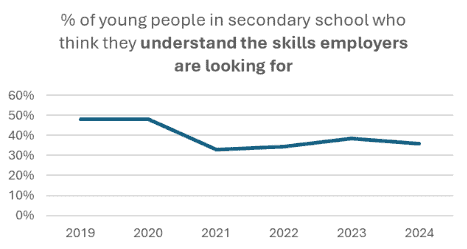A closer look at the ‘Youth Voice Census 2024’
The ‘Youth Voice Census 2024’ has just been released by Youth Employment UK – the largest dataset of youth voices in the UK with over 5,000 contributing young people. As well as offering insight into crucial topics such as youth mental health, the findings highlight young peoples’ declining confidence levels in whether they have the skills, knowledge and work experience needed to navigate their next steps in life.
Lack of work experience also continues to be perceived as a major barrier for young people accessing work and almost half (47%) think it will hold them back. The above conclusions around young peoples’ diminished confidence should be an alarm bell driving urgent change.
We drilled down into three key areas reported by young people during their time at secondary school to understand trends in recent years around career readiness issues. We looked at:
- Access to work experience
- Belief they understand the skills employers are looking for
- How much they feel their school supports them to develop the skills needed for future employability
Access to work experience: a rise from last year, but still a stark lack of access

The boost in the proportion of secondary school students being offered work experience, driven by data revealing 51% of pupils in Key Stage 4 (aged 14-16) had the option, is a step in the right direction given the overall decline over the past 6 years of census reporting. However, 36% of students accessing work experience placements is still just over half of where we were in 2020. With almost all (98%) students thinking work experience should start in schools, the frustration over lack of relevant, available opportunities is noted as palpable and access is far from equitable. Furthermore, beyond secondary school, the work experience gap widens. This year’s rise sits within an overall declining picture of careers provision, with reports of fewer opportunities to explore labour market information and enterprise activities. Fair access to impactful opportunities across regions is key. Yet, a problem at the heart of our mission to fix persists; young people mostly rely on parental or familial connections to find placements and about a third report having no help in finding placements, thus perpetuating inequality.
Employability skills confidence: declining levels across skills employers want

Confidence in employability skills has decreased at its fastest rate this year for young people in education. This is part of a wider trend of young people’s diminishing confidence in their ability to access good opportunities for learning, training, or employment. Only 36% of young people in secondary school feel they understand the skills employers are looking for – a figure that has declined over the last 5 years. Improved careers guidance, as promised by the Government, must address this. An education system which truly prepares pupils for the next steps in life must inform and empower them. Moreover, this significant decline over the past half-decade is striking amidst current concerns over skills shortages and already high rates of young people not in education, employment or training (NEET).
Feelings of school support; reduced belief in feeling supported to develop the skills they need for future employment

Young people reported that teachers, just after their parents/guardians, are the most responsible for developing their employability skills, yet around two-thirds do not feel supported enough by their school to develop the skills they need for work. Recent years show some fluctuation, yet it is clear that overall, true progress has not been made. Educators must be given the tools, knowledge and capacity to further the development of needed skills in students, and to highlight links between the learning and its relevance to future skills. The data reflects the lack of career engagement opportunities and enrichment activities reported this year too.
Our mission of high-quality work experience for all, and call for improved careers guidance, could not be more urgent.
A closer look at the recent trends paints a worrying picture. The three themes explored tell a focused but important part of a wide-ranging story as to why there are so many young people who are struggling with mental health, rising economic inactivity and high NEET rates. Behind the numbers are unique and diverse individuals eager for, and deserving of, a bright future. The last few years has caused significant disruption in parts of their lives. It must now be a national priority to strive for better, and fast, if we really want improved social mobility across the nation and the breaking down of barriers to opportunity.
The nation has a new government in power, an upcoming curriculum review, and manifesto commitments made to providing improved careers guidance and two weeks’ worth of work experience. This is the time for strides to be made towards a system that equips young people with the experience, skills, knowledge and support they need for successful and sustained transitions from school to further education, training and work.
Find out more about the ‘Youth Voice Census 2024’
Written by Nina Charalambous, Senior Policy Advisor, Speakers for Schools
